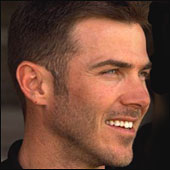Australia ageing
Daniel Laidlaw
Was Australia's outstanding run of recent success akin to the bright
explosion of a dying star?
Since the end of the Indian tour and the subsequent selection of the Ashes
squad to tour England, that question has gradually grown more troubling as
the future of the world champions is analysed. For a team that has just had
a world record streak of 16 consecutive Test victories snapped, the
likelihood of an imminent spiral seems remote. But despite those recent
results, the composition of the Australian team warrants a closer
consideration of the possibility. It could just be possible that Australia
has shone at its brightest and is about to commence fading out into a period
of decline.
This is not an over-reaction to the series loss in India. At the end of a long season, an honest examination of the future was inevitable, perhaps brought into sharper focus by recent defeat. The fact is that Australia is an ageing team. The average age of the side that played the third Test in
Chennai is 31. Its two best batsmen are nearing the end of their careers,
its best spinner is past his prime, and its best fast bowler is currently at
his peak. While the present is spectacularly successful, the future is uncertain as an evolutionary cycle reaches its conclusion.
Champion teams that cultivate sustained success usually maintain an ideal
balance of youth and experience. As the senior players retire, the young
tyros move through the ranks to replace them in a perpetual sporting cycle
designed to keep a team at its optimal level. Presently, Australia possesses
the experience but is lacking the next generation of youth to guarantee its
place at the top. Could it fall from unparalleled heights of success to
mediocrity within the next five years?
It seems unlikely, but consider how rapidly West Indies plunged in the past
five years. Since losing at home in 1995, West Indies have been abysmal away
from home as the next generation of great players, taken for granted, failed
to emerge. In hindsight, we can say that West Indies did not have a system
in place to safeguard the future, and that signs of decline were evident.
It's not beyond the realms of possibility that something similar could be
said about the current Australian team five years from now.
 Simon Katich has been touted as the next Aussie batting star for two years
and is already 25 without having played a Test. Damien Martyn is next in
line for a regular middle order berth at 29. Even if these two do make a
smooth transition to regular team members, the real problems may arise
several years further on when Slater, Hayden and Langer all reach retirement
age, and Katich and co. are expected to fill the role of senior batsmen. It
is assumed that the next tier will step up, but while they are not in the
team, it remains largely unproven.
Simon Katich has been touted as the next Aussie batting star for two years
and is already 25 without having played a Test. Damien Martyn is next in
line for a regular middle order berth at 29. Even if these two do make a
smooth transition to regular team members, the real problems may arise
several years further on when Slater, Hayden and Langer all reach retirement
age, and Katich and co. are expected to fill the role of senior batsmen. It
is assumed that the next tier will step up, but while they are not in the
team, it remains largely unproven.
Of equal concern to the dearth of young batsmen is the lack of new spinning
talent. India laments its lack of spinners yet can easily list half a dozen
emerging names, whereas Australia struggles to find any. 17-year-old
leg-spinner Cameron White made a promising debut for Victoria last season,
and left-arm wrist spinner Shannon Tubb has played a couple of matches for
Tasmania, but there are no others on the domestic first-class scene who
could be considered future Australian candidates.
Stuart MacGill should be Warne's successor but remains a wonderful talent
stuck in stasis behind him. At 30, only 18 months younger than Warne,
MacGill is too old to be considered the future answer. Of course, whether he
should have replaced Warne already is another argument altogether.
The fast bowling ranks are also thin, for outside of a serviceable group
 including Michael Kasprowicz, Andy Bichel and Adam Dale there is no-one
readily identifiable as a rising match-winner. All of this casts long-term
future of the top-ranked Test nation into some jeopardy.
including Michael Kasprowicz, Andy Bichel and Adam Dale there is no-one
readily identifiable as a rising match-winner. All of this casts long-term
future of the top-ranked Test nation into some jeopardy.
Fortunately Australia has youth on the side of its incumbent fast bowlers,
with young guns Gillespie, Lee and now Nathan Bracken all making an impact.
In the case of Lee and Bracken, they each rose rapidly to national honours,
a positive indication that fresh talent can make a quick ascension with
minimal prior warning.
Unfortunately, not enough batsmen are being picked on potential. One aspect
to admire about Pakistan's cricket is its penchant for affording young
players an opportunity to adjust to international cricket. Even if they fail
initially, at least they have had the experience to build upon. It's a
worthwhile policy. In Australia's case some, like Lee, make the transition
painlessly. Others, like Scott Muller, struggle and fade away. Nothing is
lost in the attempt. Harbhajan Singh had prior Test experience as a teenager
before truly emerging in the recent series. A taste of the big time surely
serves as a greater incentive at first-class level.
A different mindset seems to apply to selection of batsmen, however. While
bowlers are frequently tried and discarded, or selected according to
conditions, it is evidently much harder to gain entry as a batsman. While
Brett Lee exploded onto the scene two seasons ago, the last batsman to debut
for Australia was the experienced Darren Lehmann, three years ago. The last
one still in the team was Ponting, in 1995/'96.
If Australia had applied the same selection criteria to Andrew Symonds as it
did to Lee, there is no telling how far Symonds could have developed by now.
While not churning out the same quantity of first-class runs as some others,
a player of Symonds' immense potential often tends to adapt naturally to a
higher level of competition. If he is overlooked too long, that ability will
be lost.
Experience is an essential ingredient in a successful team. But in order to
maintain a sufficient experience level, a regular influx of young players is
required. Presently, Australia is jammed at the experience end, with a
paucity of new talent.
Is it possible Australia could be the next side to fall from glory to
despair through a lack of consideration for the future? Only time will tell,
but the danger definitely exists.
Mail Daniel Laidlaw